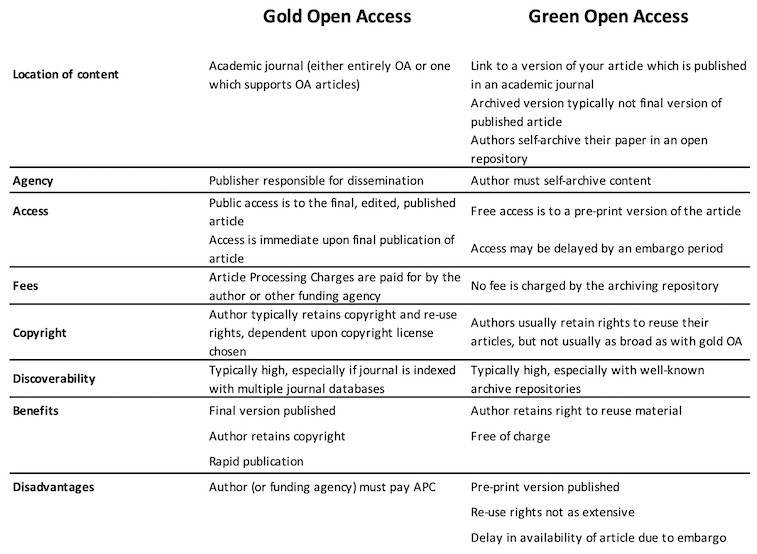Gold and Green Open Access: What they mean and imply for researchers
Open access (OA) publishing is a relatively new publishing model which utilises the internet to disseminate scholarly articles and data free of charge. Potentially, any end user with an internet connection has access to the published research. Costs associated with publication are paid either by authors or other funding agencies. Depending on the copyright terms, OA article text, images, tables and other elements can be reproduced by end users, as long as attribution to the original published source is referenced.
By its very nature and inherent mechanics, OA publishing is highly democratic. It provides a modality whereby a vast diversity of research knowledge, generated by the global research community (irrespective of nationality, gender, institutional affiliation, career stage or socio-economic circumstance), can be freely and rapidly shared. OA publishing champions the concept that access to knowledge is a fundamental human right.
Types of OA models
The majority of academic journals now offer partial or complete access to their articles. Journals typically publish articles under two main types of OA models. Each has benefits as well as implications for authors.
- Gold OA (Journal-based): The gold OA model makes the final version of the published article available for free at the time of publication. Authors retain copyright. Authors are free to reuse (often termed ‘exploit’) their content without the need to obtain permission. A downside to gold OA is that authors or other funding agencies have to pay article processing charges (APCs), which can be substantial.
- Green OA (Repository-based): In the green OA model, authors place a version of their article (usually a non-final, preprint version) in a searchable repository, often after publication, during an embargo period. Publishers retain copyright. The final, published version is normally not OA. There is no charge for depositing content in repositories.
The chart below captures key elements in both gold and green OA:

Implications and choices for authors
Publication of research is mandatory for all academic authors, and you naturally want your output published in highly visible, well-respected outlets. Historically, that has meant getting published in well-known generalist journals as well as specialty-specific journals. These publications generate impact factors and other objective metrics – numbers which can help everyone ‘keep score’ and gauge impact and success for the author’s work. Tenure committees find these traditional metrics highly useful when considering faculty members for promotions.
Article repositories do not generate this sort of objective metrics. They simply hold digital files of content and make that content available via search engines. This is not to say that article repositories are not valuable. Many repositories hold high-quality academic content that may not be discoverable in journal databases. Additionally, many repositories focus on a particular kind of material, which holds great interest for various researchers based on their fields. Open access articles found in repositories often serve as the genesis for future research.
In conclusion
Clearly, there is much for authors to consider as you select an OA journal for your academic output. Happily, your work will be available to the largest possible audience, and you will be active agents in promoting equity, diversity and inclusion in the growing body of open knowledge.
Read previous (third) in series: FAQs: Article processing charges (APCs) in open access publishing and ways to make them more equitable
Read next (fifth) in series: Hybrid and Transformative Journals: What they are and how to work with them
Maximise your publication success with Charlesworth Author Services.
Charlesworth Author Services, a trusted brand supporting the world’s leading academic publishers, institutions and authors since 1928.
To know more about our services, visit: Our Services